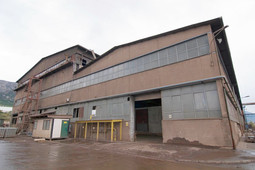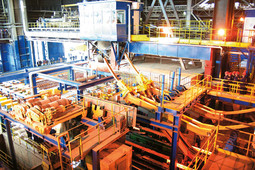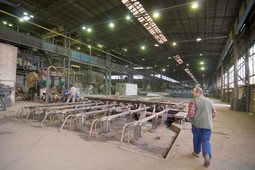Published in Nacional number 596, 2007-04-17
SCANDALOUS SALE OF THE SPLIT STEEL MILL
'By rejecting Mecelj, Croatia loses $22 million'
Aleksandar Tolkach, head of international relations of the Russian company Mecelj, explains why he believes that the company’s bid for the Split steel is the best financial option for the state
 Six foreign bids were received for the Split steel mill; last week, the CPF assessed the bid by Poland’s Zlomex as the best bid By rejecting Mecelj’s offer to takeover the Split steel mill, the representatives of this Russian company claim that Croatia has directly lost at least US$22 million. Six bidders participated in the privatisation tender: Mecelj from Russia, Zlomex from Poland, Commercial Metals International from Switzerland, Beltrame from Italy, Stemcor Split from Mauritius and Max Aicher from Germany. The Croatian Privatisation Fund (CPF) assessed the Zlomex bid to be most favourable.
Six foreign bids were received for the Split steel mill; last week, the CPF assessed the bid by Poland’s Zlomex as the best bid By rejecting Mecelj’s offer to takeover the Split steel mill, the representatives of this Russian company claim that Croatia has directly lost at least US$22 million. Six bidders participated in the privatisation tender: Mecelj from Russia, Zlomex from Poland, Commercial Metals International from Switzerland, Beltrame from Italy, Stemcor Split from Mauritius and Max Aicher from Germany. The Croatian Privatisation Fund (CPF) assessed the Zlomex bid to be most favourable.Only government confirmation remains to make the CPF decision to be final. The Russians claim that their bid was higher than the Polish bid, but that they never had a chance because the Russian company has been portrayed very unfavourably in the public and that the CPF made its decision based on reasons other than economic ones.
 ALEKSANDAR TOLKACH from Mečelj claims that a 74 million kuna investment into technology is required to modernise the Split steel millAleksandar Tolkach, Mecelj’s International Relations Director, says that their bid is the best bid, offering $22 million more than Zlomex. “Our bid states that we will pay 55% of the state debt, or 125 million kuna. The Polish bid is obliged to only pay 0.1% of those debts. As for investments, we know exactly where we need to invest. We have the same company, a factory in Romania that is almost identical to the Split steel mill. We know the exact technology, we have the same ecological problems in Romania and we have already purchased the necessary materials and technology. Our specialists have calculated the need to invest exactly 74 million kuna in technology, which is stated in our bid, over a period of three years. The business plan of the tender documentation stated gives an investment period of 5 years, but we know that production needs to be increased in Split in order to make the factory profitable. Therefore, we set an investment of 74 million kuna over 3 years. At least another 72 million kuna, an investment in labour capital, needs to be invested. The tender documentation states that the bidders must submit an investment business plan, while labour capital is not an investment. The Polish bid of 200 million kuna includes that labour capital, such that this is not solely investment in technology. By deciding to award the bid to Zlomex, the Croatian state has lost a minimum of $22 million, and maybe more, as we would invest as much as necessary in the future” commented Tolkach.
ALEKSANDAR TOLKACH from Mečelj claims that a 74 million kuna investment into technology is required to modernise the Split steel millAleksandar Tolkach, Mecelj’s International Relations Director, says that their bid is the best bid, offering $22 million more than Zlomex. “Our bid states that we will pay 55% of the state debt, or 125 million kuna. The Polish bid is obliged to only pay 0.1% of those debts. As for investments, we know exactly where we need to invest. We have the same company, a factory in Romania that is almost identical to the Split steel mill. We know the exact technology, we have the same ecological problems in Romania and we have already purchased the necessary materials and technology. Our specialists have calculated the need to invest exactly 74 million kuna in technology, which is stated in our bid, over a period of three years. The business plan of the tender documentation stated gives an investment period of 5 years, but we know that production needs to be increased in Split in order to make the factory profitable. Therefore, we set an investment of 74 million kuna over 3 years. At least another 72 million kuna, an investment in labour capital, needs to be invested. The tender documentation states that the bidders must submit an investment business plan, while labour capital is not an investment. The Polish bid of 200 million kuna includes that labour capital, such that this is not solely investment in technology. By deciding to award the bid to Zlomex, the Croatian state has lost a minimum of $22 million, and maybe more, as we would invest as much as necessary in the future” commented Tolkach.Tolkach says that Mecelj has no intention of firing workers, unlike the Polish company, that stated in their bid that they plan to reduce the number of employees from the current 480 to 370. “With respect to employees, we plan to keep them all and even hire new workers, as we wish to increase production. The factory now has a production capacity of about 180 thousand ton per year, which is good, but not a lot. Our goal is about 300 thousand tons per year, and to do that we need more employees. So, not only would we keep all the current workers, which the Polish company does not plan to do, but we would hire new people. We are a large production company, and we produce 1,385 thousand tons in rebar steel alone each year. We know how to work, we know the market, how to sell the product and how to increase production. Our strategic goal is to enter onto the market and increase production. The Polish company is much smaller. They have no experience in this kind of production and this is a lot of money for them. Our bid is the best for Croatia, for the workers and for the overall economy,” claims Tolkach.
 MECELJ PLANNED to apply the modernisation model of the Romanian factory in the Split steel millHe commented that Mecelj received no answer as to why the Zlomex bid won. “We tried to contact the Croatian Privatization Fund to give our bid that includes the labour capital. We were very surprised to see that all the bidders gave bids in which labour capital was included as an investment, as the tender document stated that only investments in technology should be stated. We even spoke with the steelworkers union in Split, and they told us they wanted us to win the bid, as we are producers and the other bidders are only traders. The workers stood behind our bid,” said Tolkach.
MECELJ PLANNED to apply the modernisation model of the Romanian factory in the Split steel millHe commented that Mecelj received no answer as to why the Zlomex bid won. “We tried to contact the Croatian Privatization Fund to give our bid that includes the labour capital. We were very surprised to see that all the bidders gave bids in which labour capital was included as an investment, as the tender document stated that only investments in technology should be stated. We even spoke with the steelworkers union in Split, and they told us they wanted us to win the bid, as we are producers and the other bidders are only traders. The workers stood behind our bid,” said Tolkach.Mecelj received a negative image in Croatia after its decision to pull out of the Sisak Steel Mill. “With respect to Mecelj’s image in Croatia, we know that this remained a problem because of the Sisak steel mill, however, we can keep our heads up and look people right in the eye when it comes to that. We did everything we could for Sisak and, when we pulled out, we fulfilled all of our contractual obligations and invested a total of $38 million in the mill. When we pulled out, we also activated the bank guarantee to pay for a portion of salaries for an additional six months after we left. So, we were very correct, we did not cheat anyone. Both the workers and union were on our side and they would like us to return. I don’t think that rejecting our offer for Split is because we pulled out of Sisak. This may be the government’s excuse, but this is not the most important issue in this case. Ultimately, we are offering the state $22 million more and, as far as I know, the Croatian Privatization Fund should be doing what is best for the state,” said Tolkach, explaining the reasons why the Russian company backed out of the Sisak mill.
 “The production profile of the Sisak steel mill is not our core business. We tried to enter into a new market segment. But in 2003, Mecelj was not was what it is today. Then we were a young company and we tried to take on new segments. We tried this in Sisak, but when we got there, we were very surprised. The technology was more than 40 years old, and everything was in very bad conditions. We tried to do our best and, when problems arose, our top managers can here and stayed for several months in an attempt to resolve them. We didn’t just give up and leave, but gave it our best shot. We also paid a bank guarantee of EUR 3.6 million, which we were not required to do according to the tender documentation, but we did because we wanted to,” he explained.
“The production profile of the Sisak steel mill is not our core business. We tried to enter into a new market segment. But in 2003, Mecelj was not was what it is today. Then we were a young company and we tried to take on new segments. We tried this in Sisak, but when we got there, we were very surprised. The technology was more than 40 years old, and everything was in very bad conditions. We tried to do our best and, when problems arose, our top managers can here and stayed for several months in an attempt to resolve them. We didn’t just give up and leave, but gave it our best shot. We also paid a bank guarantee of EUR 3.6 million, which we were not required to do according to the tender documentation, but we did because we wanted to,” he explained.“However, Split is a different story. These are well known products for us. Rebar steel is what we do and what we sell in large quantities. We know that it needs to be sold on the Croatian market, while the other bidders only want to export. Croatia needs rebar steel, and our estimates say that Croatia can accept 400 thousand tons a year. The Split steel mill could produce solely for the Croatian market, and buyers would receive a good price. In Romania, we have the factory Mecelj Tirgoviste, which is virtually identical to the one in Split. This factory has now been modernized and is the market leader for the production of rebar steel in Romania. We could create the same production technology and ecological technology in Split, as we know how it’s done and how much it costs. We even received a certificate of gratitude from the Romanian government for that investment,” claims Tolkach.
Russia’s ambassador to Croatia, Mihail Konarovski, submitted a protest letter over the CPF’s decision. “We are surprised, not only with the attempts to blemish one of Russia’s largest companies in the eyes of the public with virtual accusations of untransparent activities, but also by the intent to allow the public opinion formed in this manner, including the assessment of the employees of the Split Steel Mill, to influence the decision of the privatisation committee. An example of such an approach is seen in the release of, perhaps credible, though incomplete information on the competitive bids of other companies, which would suggest that Mecelj’s bid was poor according to a range of indicators,” states the statement from the Russian Embassy. The Russian ambassador believes that politics stands behind the privatisation of the Split steel mill. “It is difficult to avoid the impression that someone is attempting to politicize the situation and, by discrediting Mecelj, to disqualify the company as a participant in the privatisation tender prior to the official determination of the tender’s results,” stressed Konarovski.
Metallurgy giant
- Mecelj’s stocks are listed on the New York exchange
- $3.14 billion – consolidated revenues for the first nine months of 2006
- $372 million – profit in the first nine months of 2006
- $5 billion – market capitalization
- 1358 thousand tons – annual production of cast iron
- 80 thousand employees
Latest news
-
28.10.2010. / 14:15
'A profitable INA is in everyone's interest'
-
28.10.2010. / 09:38
Sanader’s eight fear SDP — Won’t bring down Government
-
21.10.2010. / 15:02
Interior Ministry turned a blind eye on Pukanic assassination
-
20.10.2010. / 09:34
Barisic could bankrupt HDZ



